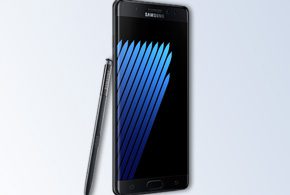Samsung’s problems with its recently recalled Note7 flagship smartphones may not yet be over.
Three weeks after Samsung began a voluntary global recall on Sept. 2 of some 1 million Note7 phones due to at least 92 cases of battery fires or explosions, the company has received notice about at least one customer in China who said that his replacement Note7 was consumed by fire when he tried to charge it, according to a Sept. 27 story by CNNMoney.
Samsung acknowledged to eWEEK that it has heard of the incident and said it is taking action to review the report. “We are currently contacting the customer and will conduct a thorough examination of the device in question once we receive it,” the company said in a Sept. 29 response to several inquiries.
The owner in China, Hui Renjie, a 25-year old technology worker, told CNNMoney that he ordered the replacement phone online following the recall and that after charging it overnight he saw it smoking the next morning. It then burst into flames, he said, and shared a video he claimed portrayed the incident.
“China was not included in that recall because the batteries in the phones sold there came from a different supplier, Samsung said at the time,” according to the story. Four other such incidents were also reported in China since this report, the story continued.
Samsung did not reply to additional questions from eWEEK about whether the phone in the alleged fire incident in China, including whether it involved one of the new devices distributed following the recall. Samsung said previously that the new devices issued since the recall include a battery made by another supplier.
In a separate report, Samsung claims that more than 1 million customers around the world now have received and are using replacement Note7 smartphones that include batteries that are approved for use, according to a Sept. 29 story by Reuters. The approved batteries do not contain the flaws that allowed earlier batteries to catch fire or explode.
“Samsung, in a statement issued on its China website, apologized to its consumers for failing to providing a detailed explanation why the smartphones on sale in China were safe, as they used batteries that came from a different supplier to those that could overheat,” the story reported. The new replacement Note7 phones that are being out for the original devices use the same unaffected batteries that continue to be supplied for the phones in the Chinese version, Samsung told the news agency in a statement.
Samsung has said that some 90 percent of Note7 owners are staying with the model after returning their phones due to the global recall, according to a Sept. 27 eWEEK report.
Some 1 million Note7 smartphones were recalled Sept. 15 by the U.S. Consumer Product Safety Commission after at least 92 battery fires or explosions were reported with the new phones due to a defect in the handsets’ batteries. The recall, known as Recall No. 16-266, applies to all Galaxy Note7 smartphones sold before Sept. 15, according to the agency. The move comes because “the lithium-ion battery in the Galaxy Note7 smartphones can overheat and catch fire, posing a serious burn hazard to consumers,” the agency said.
Under the recall, the CPSC advised owners of the affected smartphones to immediately stop using and power down the recalled Galaxy Note7 devices purchased before Sept. 15 to prevent further fires or injuries.
The Samsung Note7 has been sold through AT&T, Best Buy, Sprint, T-Mobile, U.S. Cellular and Verizon, as well as through Samsung and other websites from August 2016 through September 2016 for between $850 and $890.
Consumers are being urged to contact their wireless carriers or the store where they bought their phones for a replacement Note7 phone that is free of the defect or for a refund of their purchase price. Galaxy Note7 owners can also contact Samsung toll-free at (844) 365-6197 anytime or go online at www.samsung.com to replace their phone or arrange a refund, according to the CPSC.
Samsung had announced its own voluntary initial recall program on Sept. 2 before the CPSC recall.
